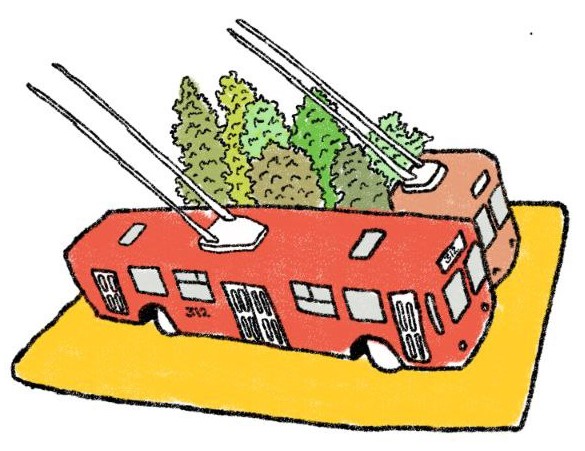19.11.2024. Reconstruction for charging facilities
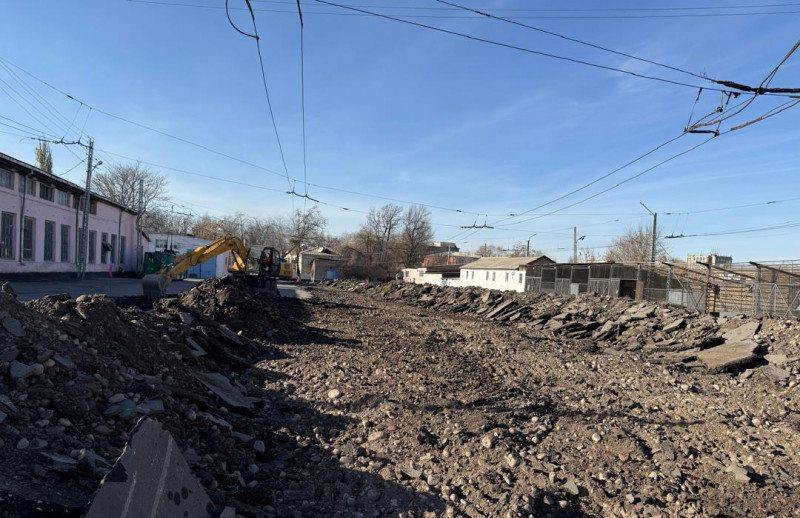
This is how the reconstruction of the trolleybus depot for charging facilities look like.
9.11.2024. Publication in the Berliner Gazette
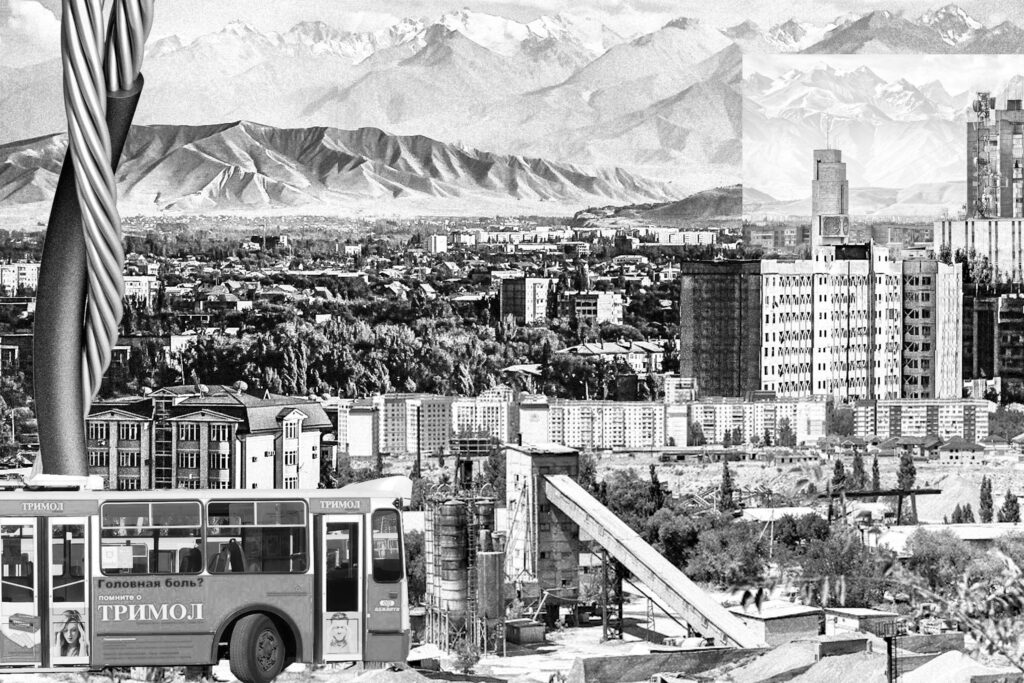
Bermet Borubaeva and Egor Muleev published a paper called “Governing ‘Green’ Public Infrastructure: The Trolleybus Case in Bishkek” in Berliner Gazette.
6.11.2024. Temporary closure
According to the Mayor’s Office, the last three trolleybus lines will be temporarily suspended due to the 11th Summit of the Council of the Organisation of Turkic States.
17.10.2024. Bishkek Urban Forum
As stated by an official at the Bishkek Urban Forum, the trolleybus system will remain operational in the city until spring. Following this period, the system will be dismantled entirely due to the high costs associated with its maintenance. Concurrently, the city will implement a new route network and construct numerous bypasses and bridges in order to address the existing transport issues.
15.10.2024. Construction activities in depot
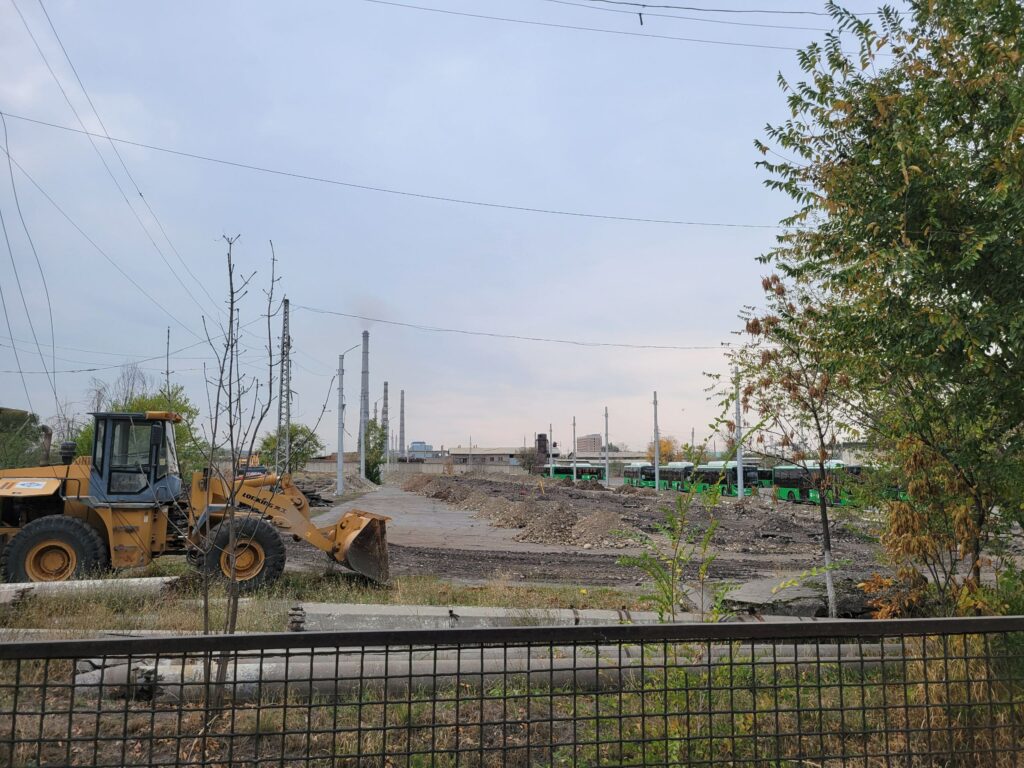
The construction works commenced in Depot N2, with the installation of charging infrastructure seemingly underway. Despite the remaining 15 vehicles, the overhead wires have been dismantled.
30.09.24. Publication in German and French!
The online resource Novastan.org published a text on the trolleybus conflict in Bishkek. A detailed description of the problem is presented in French and German. Thanks to Eleonora Darasse and Robin Roth.
25.09.24. Bermet’s speech at the T2M conference in Leipzig
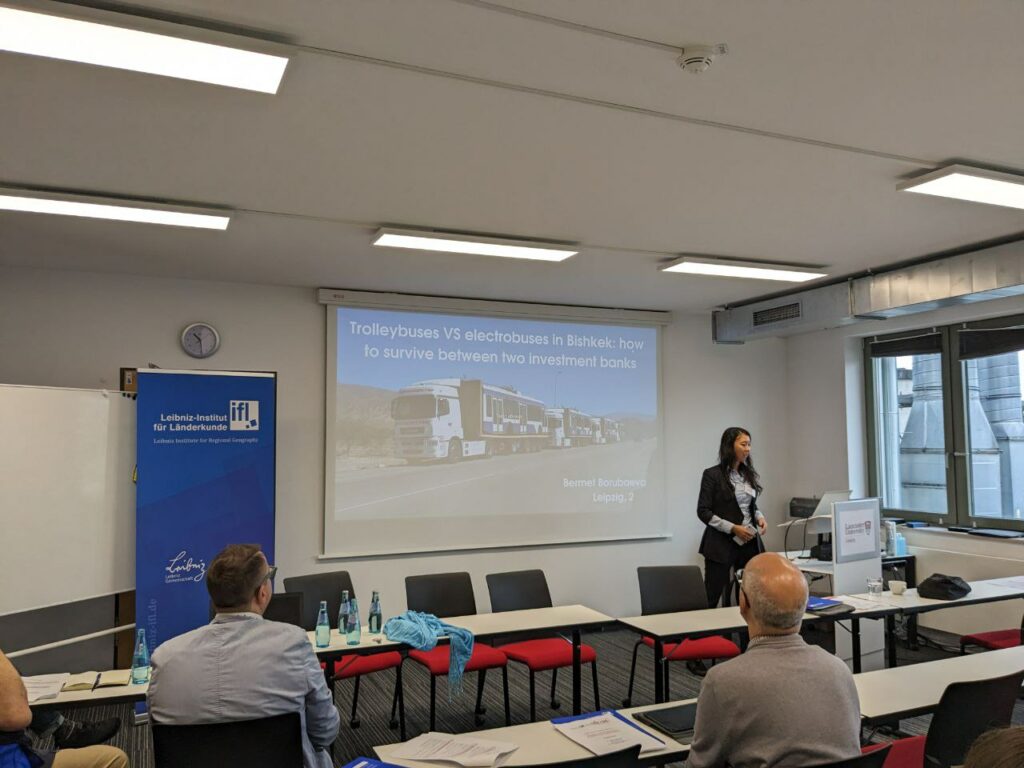
Bermet’s presentation at the T2M conference was entitled “Trolleybuses vs. Electrobuses in Bishkek: how to survive between two investment banks”. The talk was very well received and Bermet spent the rest of the conference networking with mobility researchers from around the world.
7.09.24. The second Civil Assembly Kurultay
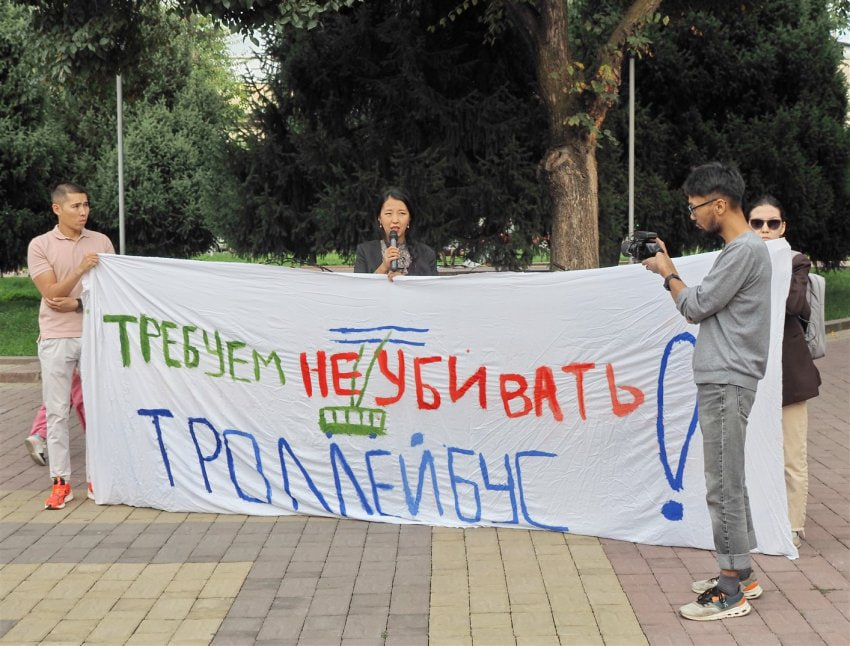
The second Transport Kurultay was held in Bishkek on 7 September. With the start of the school year, citizens are stuck in traffic jams, the announced electric buses have not been delivered to the city, and half of the trolleybus fleet is out of service. At the same time, the existing system does not have vehicles of large capacity, and there are no rail transport capable of carrying large flows of passengers. The 12-metre trolleybuses are replaced by 11-metre CNG buses. The main topic of the second Kurultay was the city’s transport problems. However, this did not attract much attention from the population and about 30 people attended the event.
5.09.24. Short description of the recipient city Osh
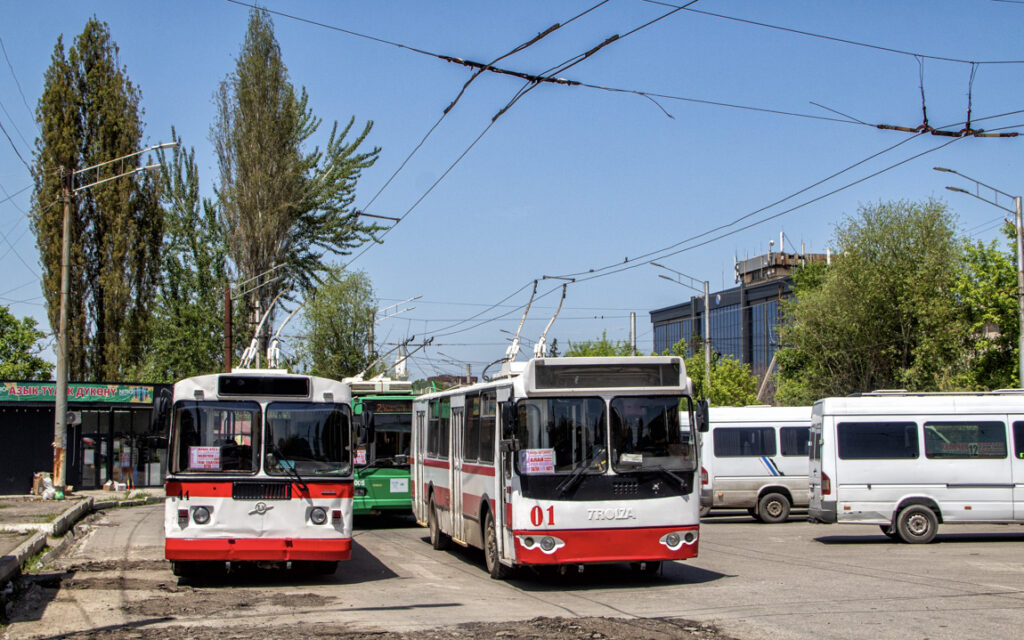
Today there are two trolleybus lines in Osh, each with 13-15 vehicles per line. In total, the system has 30 trolleybuses and a single depot. In 2018, 23 vehicles were received under a loan from the EBRD. The city intended to build another line, but this plan was suspended. Last year, however, a new credit agreement for $23 mln was signed between the Ministry of Finance and the EBRD on the development of electric transport in Osh. In addition, about 50-70 new buses occupy all the available space in Osh’s trolleybus depot. In light of this, the need for 100 used trolleybuses, 200 km of wires and 15 substations from Bishkek is highly questionable. And indeed, there is no justification for it.
4.09.24. Transfers on the move
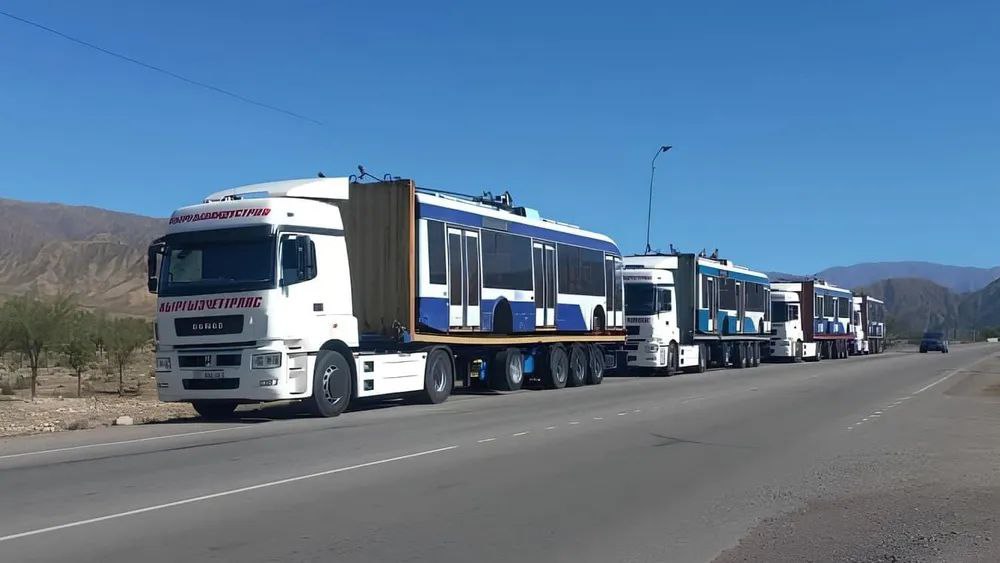
Someone saw trucks carrying trolleybuses on the road between Bishkek and Osh. According to a Kyrgyz news agency, a transport company was supposed to move trolleybuses, cables and substations in 152 trips. The distance between the cities is almost 800 km and the road is in mountainous terrain.
29.08.24. We are against!
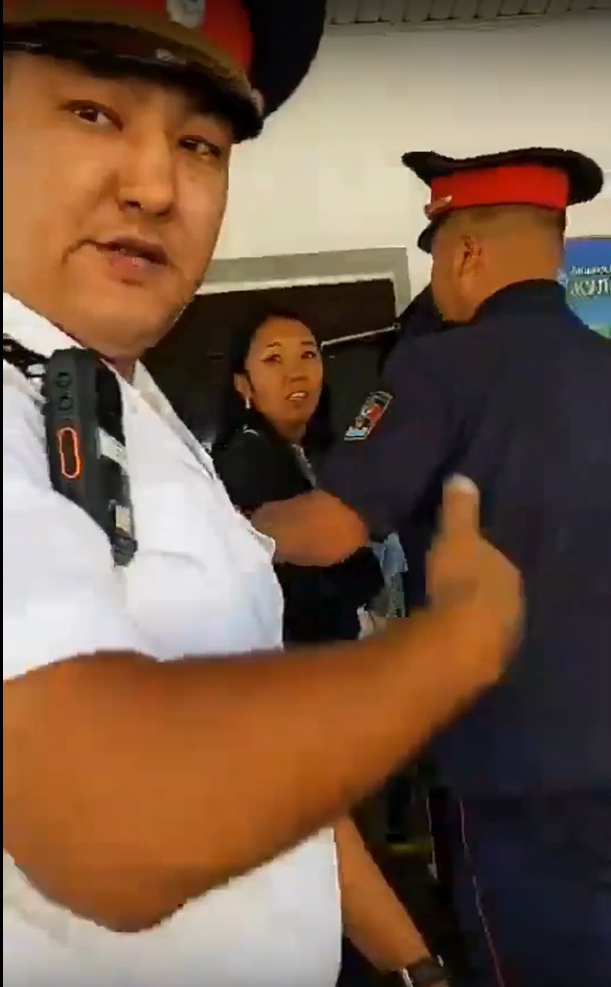
The issue of trolleybuses was raised at a meeting of the city’s deputies, attended by the mayor. There had been no changes since the last discussion of the issue on 3 July, but the lack of clear reasons did not prevent the deputies from approving the transfer of the trolleybus system. Despite the obstacles, two activists managed to enter the meeting and protest against the decision, claimed “We are against it!” The activists were arrested by the police and taken to the police station on the grounds of public order violation.
28.08.24 Press conference
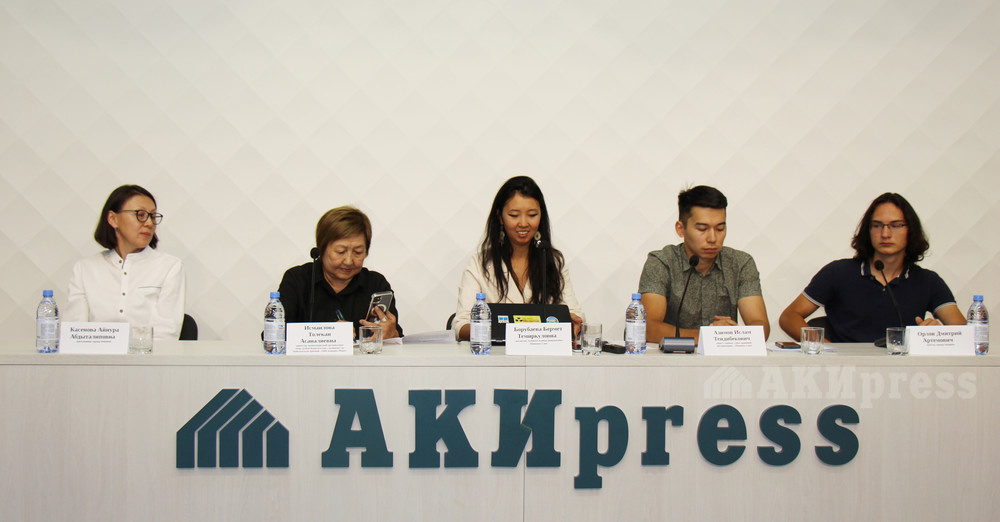
On the eve of the first meeting of the city deputies, representatives of the initiative group organised a press conference. The activists, with the help of lawyers, filed a lawsuit against the Bishkek Trolleybus Authority, accusing the municipal company of illegally dismantlement the infrastructure.
26.08.24. Cuts and lies
Activists arrived at the night cut in the city center and found the deputy head of the Bishkek Transport Department. He gave a variety of answers to the question about the legal basis for the demolition. One day he referred to the Bishkek Architecture Agency’s project. Surprisingly, the agency replied that there was no such section in the reconstruction project. Another day he reported that the demolition was due to the creation of a “green corridor” in accordance with the Asian Development Bank (ADB) requirements. Similarly, the bank’s representative said that “ADB has not received any instructions from the city that the trolleybus will no longer run on Kievskaya Street. In fact, our Kievskaya Street Green Corridor project fully includes a trolleybus contact network”.
1.08.24. Trolleybus in the main planning document from 2006

The materials of the city’s 2006 main planning document envisage the development of trolleybus infrastructure to 370 km in 2025 (215 km in 2024), bringing the number of vehicles in the fleet to 400 (144 in 2024) and opening a third depot (the city still has two depots).
31.07.24. Civil Assembly Kurultay
On 31 July, the initiative group organised a public meeting with an open microphone. 50 signatures were collected against the demolition and many citizens expressed their feelings about the initiative to transfer trolleybuses to Osh. For example: “If you take away the trolleybuses, you take away a part of the soul of this city”.
19.07.24. Publication from the Bankwatch Network
The Asian Development Bank (ADB) and European Bank for Reconstruction and Development (EBRD) need to investigate the impact of their public transport projects in Bishkek, Kyrgyzstan as the city’s urban mobility system gets a complete overhaul without transparency or public participation.
Full version is here.
14.07.24. Trolleybus tour
The initiative group to save the trolleybus invited a well-known city tour guide to speak in the cabin of the trolleybus of route 11. This was a kind of reconstruction, as there was a similar initiative in Soviet times. The excursion flowed smoothly into a small rally, where both local history issues and the latest initiatives of the city mayor’s office related to electric transport were discussed.
11.07.24. Response from the legal authorities
According to the public prosecutor’s office and the courts, the dismantling of the trolleybus wires was done on a legal basis. Human rights organisations, for their part, have the opposite point of view.
4.07.24. A comment about the feasibility study for the procurement of ebuses
A transport specialist from the Institute of Regional Geography has reviewed the feasibility study justifying the purchase of electric buses with ADB funds. His summary is as follows:
This is a good exercise in comparing different technologies available to improve urban transport. However, Grütter Consulting’s contribution should be taken very cautiously, due to the absence of local empirical data, lack of sources, questionable calculations and a very pronounced fascination with one particular technology.
Full version is here.
3.07.24. “NO” from city deputies
The system of city government suggests that many initiatives of the mayor’s office should be approved by the city’s deputies. On 3 July, during the discussion in the Standing Committee on Municipal Property, the deputies did not approve the transfer of the trolleybus system for two reasons. Firstly, there are around 300 petitions from citizens against the transfer. Secondly, the dismantlement of the trolleybuses requires the consent of the EBRD, which provided the loan for the purchase of the trolleybuses in 2018.
3.07.24. “Last Trolleybus” Action
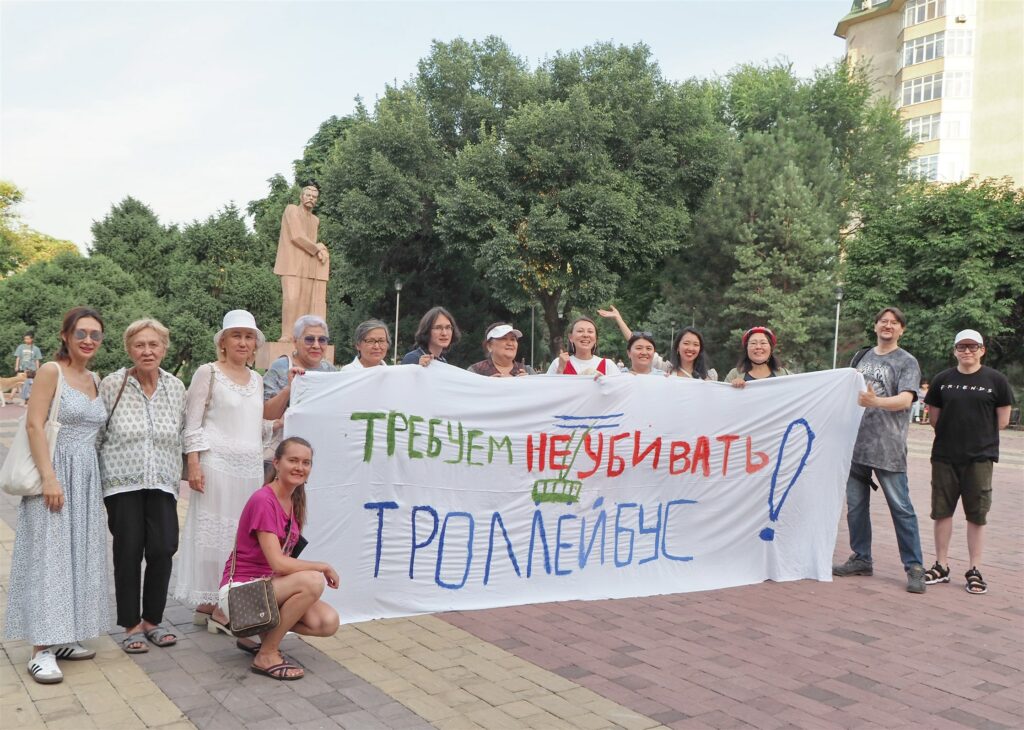
The “Last Trolleybus” action was planned for 3 July. The idea was that passengers would gather at the stop near the city hall, waiting for a trolleybus that would never come (there is no trolleybus service there). The police appeared and pushed the participants back to the park, citing a ban on rallies. The initiative group had to hold a public event in another place, and subsequently filed a lawsuit, as there was a violation of the constitutional right to assembly.
1.07.24. Bureaucracy strikes back
According to a leaked letter from the EBRD to the Bishkek mayor’s office, the bank is requesting a justification for the destruction of the trolleybus system in the city. In particular, the bank is interested in “a detailed economic and operational justification for the transfer of trolleybuses, as well as Bishkek’s plans for the existing trolleybus network and its infrastructure in the context of the city’s transition to a sustainable and environmentally friendly transport infrastructure”. In 2018, the last fleet renewal and electrical infrastructure repairs to date were carried out using loan funds. Despite the fact that the loan still needs to be repaid, city officials have decided that this is not a problem and have started the dismantlement.
29.06.24. Reasons to destroy
The Rescue group received an official response from the mayor’s office about the reasons for the dismantlement of the system. First of all, “dismantling is carried out…. in order to form an integral architectural and aesthetic image of Bishkek city …. as a result … the city will acquire a visually aesthetic appearance”. But the most amazing thing is the creation of “a unified system of connections in the city, which will provide an opportunity for further infinitely sustainable development”. Yes, that’s what it says – “infinite”. No economic parameters, no technical issues, no energy shortages or severe environmental problems, no – the problem is the wires.
28.06.24. Exhibition, action and police
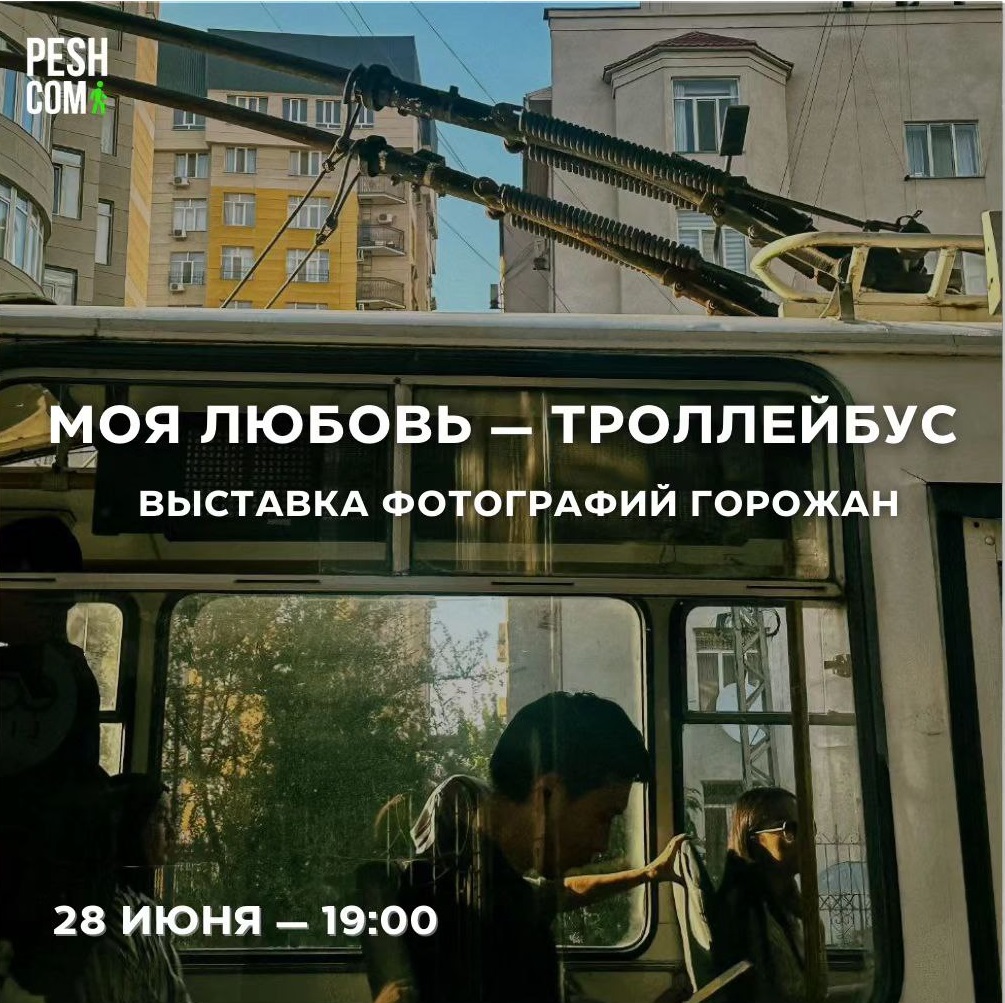
(My love is the trolleybus, the citizens’ photo exhibition)
Activists of the urban initiative Peshkom with the Trolleybus rescue group held an action-exhibition called “My Love is the Trolleybus”. On the way to one of the park where the photo exhibition was planned, the members of the initiative group moderated a public discussion of the history of Bishkek trolleybuses inside the trolleybus. Upon arrival at the park, in addition to the activists from Peshkom, they were met by the police. The authorities apparently had no love for trolleybuses anymore.
21.06.24. The Social Democrats have appealed to the prosecutor’s office
The head of the Social Democratic Party filed an application to the prosecutor’s office. He suspects the city mayor’s office of abuse of power.
20.06.2024 Meanwhile the dismantling of the catenary is now done at night!
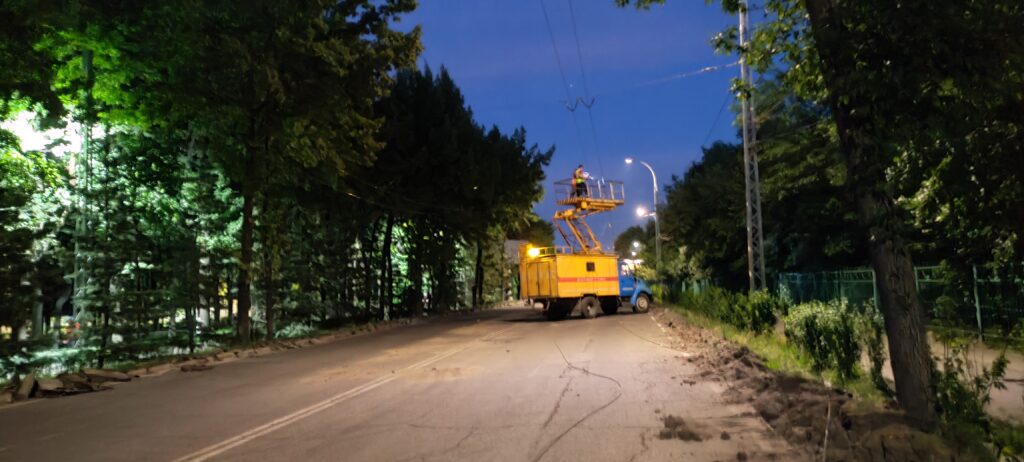
20.06.2024 Mayor clarifies reasons for the demolition of trolleybus
The mayor addressed the representatives of parliamentary factions, where he explained that 70% of the lines have exhausted their resource, that the repair of a metre of overhead wires costs $8, that only a circular trolleybus line will be introduced (where there is no infrastructure now), that Chinese electric buses will soon arrive, and that the mayor’s office is planning to build… a cable car!
19.06.24. The dismantlement of the overhead lines has begun
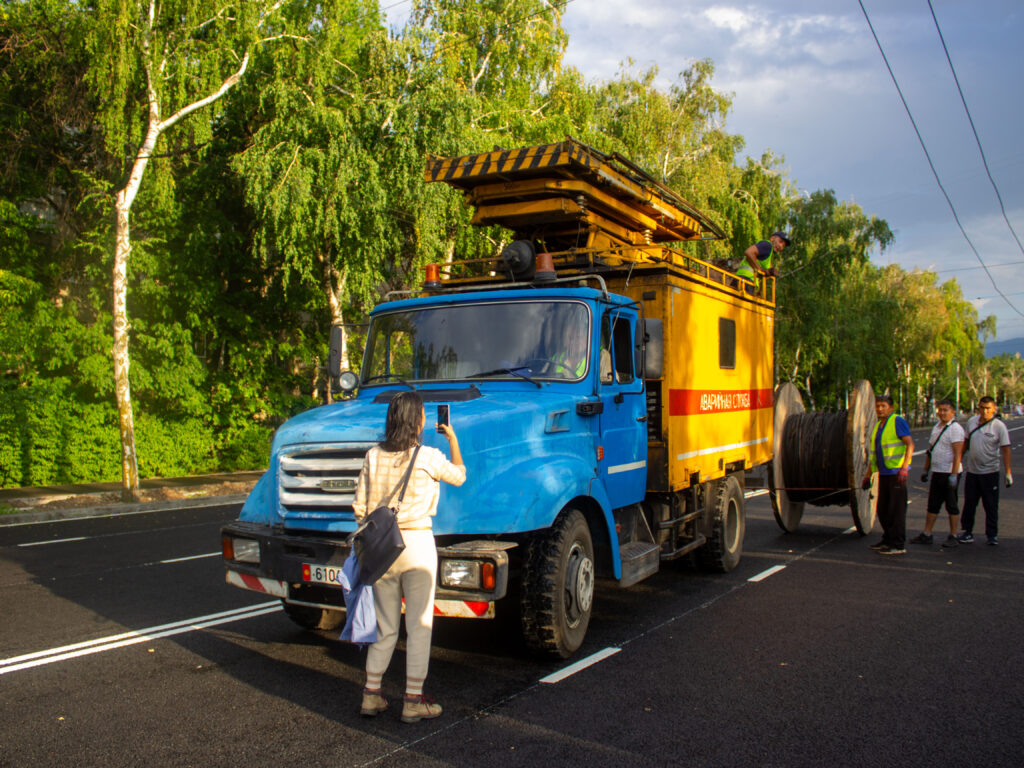
During the day, the demolition of overhead wires was recognised. A group of workers using a special vehicle made the first cuts of the overhead wires. Members of the Trolleybus Rescue Committee arrived almost immediately. Bermet stopped the vehicle in a very Tiananmen style. The dismantling was stopped. Now the demolition is official, regardless of the lack of approval from the city deputies and the outcome of public hearings!
6.06.2024 On giving consent to transfer passenger trolleybuses into the state ownership of the Kyrgyz Republic free of charge
The city hall has launched a resolution to transfer the trolleybus system to the second largest city in the country. The list includes 100 trolleybuses and 9 substations (the Kyrgyz version of the papers lists 15 substations and 180 kilometres of wires). However, the city administration system is organised in such a way that decisions of the mayor’s office must be approved by city deputies. In addition, online public hearings must be held within a month.
